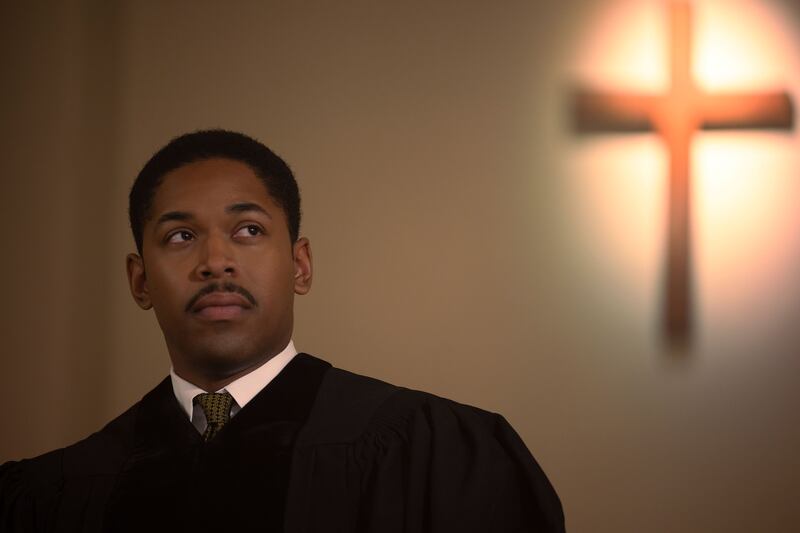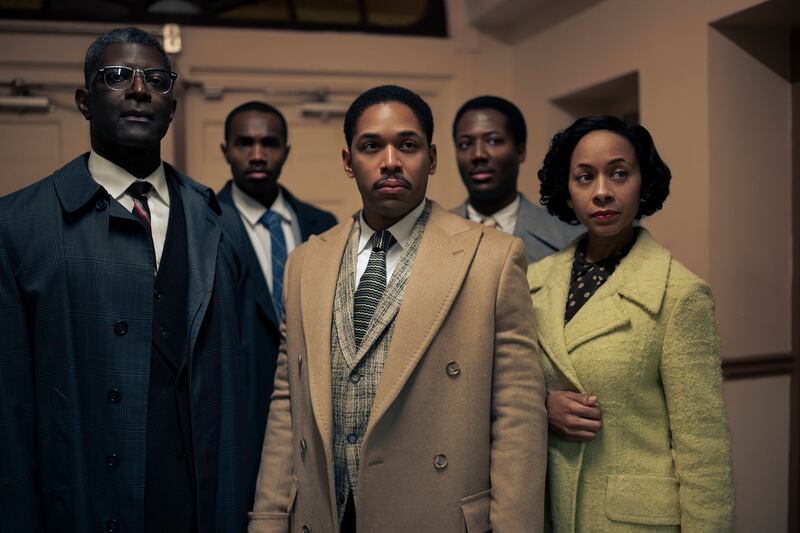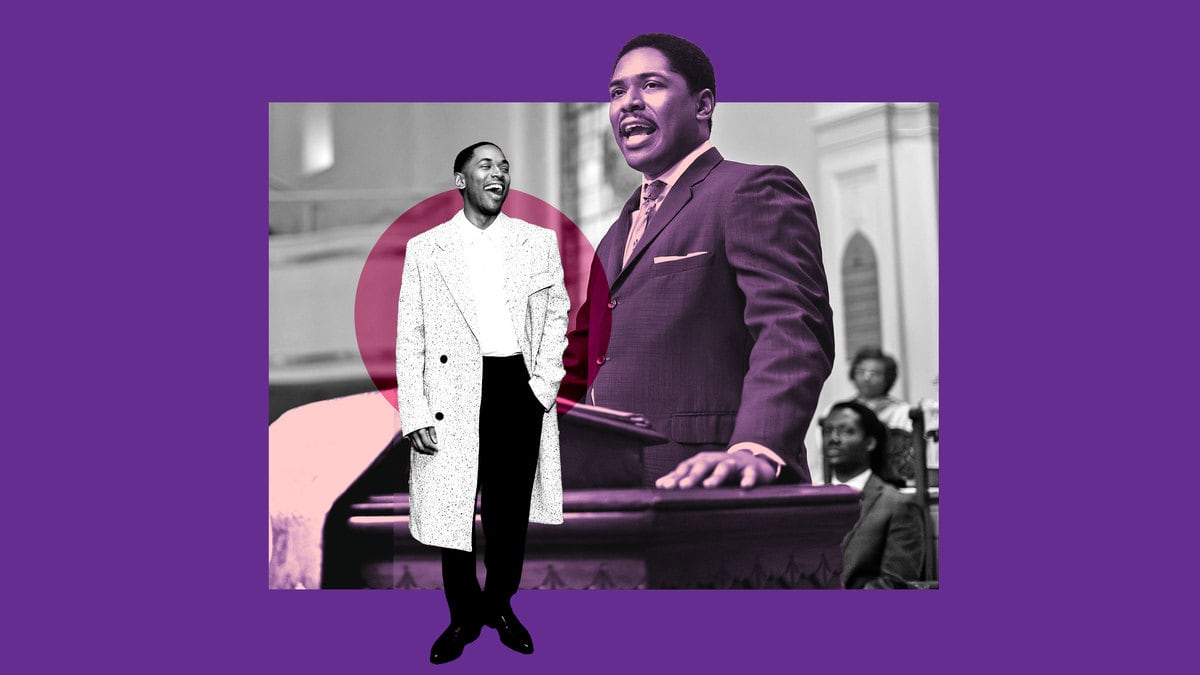When National Geographic first approached Gina Prince-Bythewood and Reggie Rock Bythewood about producing the fourth season of the Genius anthology docu-drama series, only one civil rights leader was put forward. Previously, Albert Einstein, Pablo Picasso, and Aretha Franklin have been the focus of installments, but the couple knew if they were going to proceed with this project, this one would need to be a double-header. Enter, MLK/X.
“While we absolutely revere Dr. King and want to tell his story, we said to them, ‘You don’t get Dr. King without Malcolm X,” Prince-Bythewood tells The Daily Beast’s Obsessed. “They were certainly two sides of the same coin. They inspired, fueled each other, and were both absolutely integral to the Movement.”
In fact, this season of Genius also centers on Dr. Martin Luther King Jr. (Kelvin Harrison Jr.) and Malcolm X’s (Aaron Pierre) spouses, exploring the icons’ partnerships with Coretta Scott King (Weruche Opia) and Betty Shabazz (Jayme Lawson). “All respect to NatGeo; they embraced us disrupting the Genius franchise and telling the story of, really, two men, but four icons,” says Prince-Bythewood.
Across eight episodes, showrunners Damione Macedon and Raphael Jackson Jr. depict events spanning four decades, revealing the formative moments that laid the groundwork for King and X’s intersecting paths as American Civil Rights visionaries. From the 1955-56 bus boycott and the 1963 March on Washington to 1957’s bold mass demonstration against the NYPD, Genius showcases public action and the private moments in between.
It is an exploration of how the two men differ and the overlapping struggles they endured because of the in-fighting within their respective organizations, the constant surveillance and scrutiny from law enforcement, and endless threats on their lives.
“Getting eight hours to tell this story meant we weren’t just focusing on an event. We got to go into the before and after of all of their lives,” says Macedon.
Dr. King and Malcolm X have been portrayed on screen and stage—and in books—innumerable times, including executive producer Jeff Stetson’s play The Meeting, which served as an inspiration for the series. Stetson also wrote the MLK/X pilot, giving a glimpse of King and X’s only public encounter with each other. It was Mar. 26, 1964, when both men visited Washington DC. The occasion? Segregationists were filibustering the Civil Rights Act, and the two men traveled to Capitol Hill to show their support for the bill.
The series is also a love story spotlighting joyful experiences. “It’s easy to think of these icons as always serious, but they’re also fun. They like music, they dance,” says Bythewood. “They both like ice cream, you know, and it’s like, ‘Well, yeah, who doesn’t like ice cream?’ But just leaning into the humanity of it all, leaning into their relationship, leaning into the courtship.”
Showrunners Macedon and Jackson Jr, executive producers Prince-Bythewood and Bythewood, and actors Harrison Jr, Opia, and Lawson spoke with Obsessed about bringing these titans to life, the series’ depiction of mental health, the love stories threading throughout MLK/X, and the challenges of bringing these events to life.

Kelvin Harrison Jr. as Martin Luther King Jr.
Richard DuCree/National GeographicThe big four
Harrison Jr. is no stranger to playing historical figures, having recently headlined Chevalier as the French classical composer and virtuoso violinist Chevalier de Saint-Georges, B.B. King in Elvis, and the forthcoming Samo Lives, where he is taking on artist Jean-Michel Basquiat.
“I think it is more difficult, to be honest, when you have so much footage. Also with Dr. King, everyone knows Dr. King—literally, Dr. King is more famous than Michael Jackson—and so that’s really intimidating off top,” Harrison Jr. says. While he played a snapshot of B.B. King in Baz Lurhmann’s heightened Elvis Presley extravaganza, everything about Genius is grounded in reality.
Plus, playing Dr. King from age 20 to 39 presented an existential obstacle for the actor, who won’t hit 30 until the summer. “There’s a part of this life that I actually understand, and there’s a part of this life that I haven’t even touched yet,” Harrison Jr. says. “So it became more of an intellectual exercise and a spiritual exercise than a transformation thing.”
When casting the two couples—“the big four”—Prince-Bythewood says it is important to remind audiences of their ages. “Too often people think of them as much older—Dr. King was 26 when he led the bus boycott—so to see them as youthful as they are, it felt like a different way to tell this narrative in a very truthful way,” she says. Prince-Bythewood also says that Harrison Jr., Pierre, Opia, and Lawson encapsulated what was required for these characters: “Four phenomenal actors who embrace this challenge, were afraid of it—which is a good thing—gave everything, dove into the research, didn’t do imitations, found what spoke to them about each character and embodied them beautifully.”
Genius isn’t the first time Harrison Jr. and Pierre’s paths have crossed, as they started working together on Barry Jenkins’ Mufasa: The Lion King the year before—Pierre as Mufassa, Harrison Jr. as Scar—but they hadn’t met each other in person. “He’s so tall, and he’s so cool. He’s such a presence. I was enamored by him, and I was a fan. One of the reasons I did this show was because Aaron was attached to it,” Harrison Jr. says.
Riding home together after a cast dinner the night before shooting the Capitol Hill scene gave the two actors a chance to chat about playing the civil rights legends before their first day on set. “Aaron says it so beautifully and eloquently about us protecting our safety and mental health as we go through the process of, ‘If we’re not good, then how are we going to be able to offer ourselves to these incredible men,’” Harrison Jr. says. “That became the biggest thing.”
Two love stories
When Martin and Malcolm first meet in the series, they immediately shake hands. But Lawson, who plays Betty, says that because Betty and Malcolm couldn’t physically touch during their courtship, the characters had to communicate with their eyes. “Aaron and I spent a lot of time just how to channel all of that energy and focus it just here [the eyes] and build that chemistry that way,” she says.
Dealing with the external pressure of what it meant to be married to a figure facing ongoing threats and opposition is only one part of the relationships depicted in the show. Harrison Jr. says it was essential to capture the Kings “like high-school sweethearts almost, they know everything about each other and they just want to laugh, support and hug each other and watch movies together, and make their favorite snacks.”
Opia, who plays Coretta, also agrees with Bythewood about a defining element of the show’s portrayal of marriage: “I see this show as a love story as well: a love story between Martin and Coretta, a love story between Malcolm and Betty, and the love stories all together with the cause.”
While the series is called MLK/X, Corretta, and Betty are far more than simply supporting characters with no inner lives. The fifth episode, “Matriarchs,” gives Opia and Lawson space to explore these women, including their past and ambitions. “It’s wonderful to be given the chance and the privilege to put your own spin on what’s existed already,” says Opia. “But with a bit of trepidation in making sure I was making decisions that I thought would best serve them, and having the responsibility, reverence, and the utmost respect to have a part of keeping their legacies alive.”
Digging into how Betty and Coretta impacted the Movement and were, in turn, impacted by their husbands’ public status is threaded throughout the series. “They were civil rights icons in their own right, and the more we learned about their role in everything, it was very clear that as storytellers, we couldn’t have told this story without illuminating them to the umpteenth degree,” says Macedon.

A mental health exploration
Exploring these figures’ private lives meant touching on events or experiences an audience might be less familiar with—or even not know about.
When Harrison Jr. read the show’s storyline depicting adolescent Martin’s mental health crisis, which he endured after his grandmother passed away, he asked, “Did this actually happen?” Deep diving into research gave Harrison Jr. further insight.
“What’s fascinating is I think that moment does drive a lot of his movement. It’s one of the biggest obstacles he’s had to overcome,” says Harrison Jr. “It has, I think, more to do with his fear of not being enough, not being capable—this imposter syndrome—and wanting to escape the pressure.”
There’s a scene Harrison Jr. thinks about, where, several years before Martin’s grandmother dies, his father changes his name and tells him he is “chosen,” saddling him with a life of responsibility. “What’s interesting about the relationship [with Daddy King] is the expectations are infused with anxiety. It’s trying to look too far into the future when a lot of us are just trying to figure out the present,” he adds.
Malcolm’s childhood is marred by violence, loss, and trauma. Prince-Bythewood mentions how Malcolm’s mother being institutionalized when he was young left deep mental scars, and “it was yet another parallel that connected them.”
Again, knowing that so many of these defining moments happened during these characters’ mid-twenties—as well as amongst their marital ups and downs—was something Macedon and Jackson Jr. kept in mind while crafting the series, as well as the need to contextualize the amount of time the men spent away from home as part of their missions. “Martin and Malcolm, in about a four-year time span, traveled every day for 340 days a year,” says Macedon. “So that kind of toll, being on the road ad nauseam for that long, away from your wives and family. It would be impossible for it not to weigh on you personally.”
Harrison Jr. and Pierre both rise to the challenge of capturing the different moods of these men as they confronted the pressure of being the faces of the civil rights movement, becoming fathers, and being the targets of violence. “As reported to us, Dr. King suffered from bouts of depression with everything that had gone on. He had a lot of different gears, and I think it was important to honestly reflect that,” says Bythewood. “It makes them both more accessible to us when we can see them as human beings in that way.”






